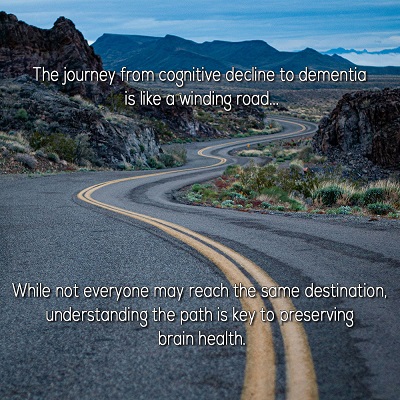 Are cognitive decline and dementia the same? Well, they are closely linked, but they are not the same. Cognitive decline is a gradual decline in your mental abilities such as in keeping your memory, maintaining attention, reasoning ability, and language skills. We accept this decline as being a normal part of aging.
Are cognitive decline and dementia the same? Well, they are closely linked, but they are not the same. Cognitive decline is a gradual decline in your mental abilities such as in keeping your memory, maintaining attention, reasoning ability, and language skills. We accept this decline as being a normal part of aging.
Dementia, on the other hand, is a syndrome characterized by a significant decline in cognitive function that interferes with daily life and activities. It is not a specific disease but rather a group of symptoms caused by various conditions or diseases affecting the brain, such as Alzheimer’s disease or vascular dementia.
The reason they are closely linked is that cognitive decline can be one of the early warning signs of dementia. For example, being forgetful and not having as good a memory as you once did when you were young, doesn’t mean you necessarily have dementia.
What’s important to remember is that not everyone who experiences cognitive decline will develop dementia. It depends on what is causing the decline!
Some cases of cognitive decline may be caused by things such as medication side effects or vitamin deficiencies. If these are the causes of cognitive problems, they may be able to be reversed, simply by changing the medications taken or giving the right vitamins.
Common Signs of Cognitive Decline or Dementia
The warning signs of cognitive decline or dementia can vary. Everyone is different and there are different causes. The signs may be similar which is why you need to seek professional advice.
However, here are a few signs of cognitive decline that may indicate a more serious problem.
Memory Loss
This is the most common sign and can really disrupt your life. It can be very frustrating for anyone. This type of memory loss can be exhibited in various ways, and not just in misplacing what you had in your hand a moment ago, like your reading glasses, which is a common one.
It may be that you are now continually forgetting important dates, and you never have before. For example, birthdays, anniversaries, appointments, or other significant occasions that you have always typically remembered.
You may also be starting to ask the same questions repeatedly, even after receiving an answer, as if you haven’t heard the answer at all. This behavior can occur because either you don’t remember the previous conversation or because you have difficulty retaining new information.
Difficulty with Making Decisions and Solving Problems
Cognitive decline or dementia can also impair a person’s ability to make decisions in their planning, organizing tasks, and performing tasks that require sustained focus and attention. If that’s you, do you find it difficult to identify problems that arise and have a hard time trying to solve them?
It can also impact your judgment, leading to difficulties in assessing risks, making sound decisions, and evaluating the consequences of your actions. This decreased judgment can result not only in making poor decisions, but in some people, they may begin to engage in risky behaviors or neglect to do things they never would normally.
In cases where cognitive decline progresses to dementia, these difficulties with decision-making and problem-solving can become more pronounced and may significantly impair their ability to function independently.
Changes in Mood or Personality
These are also common symptoms associated with cognitive decline and dementia. As cognitive function deteriorates, people may show changes in their emotional responses and behaviors.
They may become easily agitated, irritable, or upset, and these changes in mood may occur unexpectedly, even when in familiar surroundings. They may also feel depressed, sad, hopeless, or worthless, and their increased worrying can raise their anxiety levels.
If you are noticing changes in your mood it may begin to affect your close relationships. If it is, it can make life very difficult, so it’s important to get the care needed for all concerned.
Final Thoughts
Aging is a universal process that happens to us all, unfortunately, and with it comes the potential for cognitive changes and disorders, such as dementia. Recognizing the signs of cognitive decline and dementia early on is important so that you or whoever is concerned, receives the intervention and support that will be needed.
By seeking appropriate medical evaluation and implementing effective management strategies, it’s easier to handle the challenges associated with these conditions.
Early intervention not only helps to maintain independence and safety but also contributes to overall physical and emotional well-being. By being proactive, you or your loved one can receive the necessary care and support to manage the symptoms effectively and help to maintain a better quality of life!






